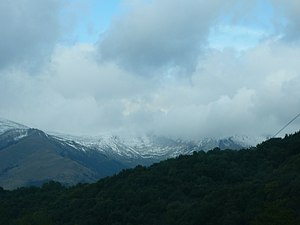Battle of Zlatica
| Battle of Zlatitsa | |||||||
|---|---|---|---|---|---|---|---|
| Part of Crusade of Varna | |||||||
 Sredna gora |
|||||||
|
|||||||
| Belligerents | |||||||
|
|
|
||||||
| Commanders and leaders | |||||||
|
|
* |
||||||
The Battle of Zlatitsa (Bulgarian: Битка при Златица) was fought on 12 December 1443 between the Ottoman Empire and Serbian Hungarian troops in the Balkans. The battle was fought at Zlatitsa Pass (Bulgarian: Златишки проход) (Turkish: Izladi Derbendi) near the town of Zlatitsa in the Balkan Mountains, Ottoman Empire (modern-day Bulgaria). The impatience of the king of Poland and the severity of the winter then compelled Hunyadi (February 1444) to return home, but not before he had utterly broken the Sultan's power in Bosnia, Herzegovina, Serbia, Bulgaria, and Albania.
In 1440 John Hunyadi became the trusted adviser and most highly regarded soldier of the king Władysław III of Poland. Hunyadi was rewarded with the captaincy of the fortress of Belgrade and was put in charge of military operations against the Ottomans. The king Władysław recognized Hunyadi's merits by granting him estates in Eastern Hungary. Hunyadi soon showed and displayed extraordinary capacity in marshalling its defenses with the limited resources at his disposal. He was victorious in Semendria over Isak-Beg in 1441, not far from Nagyszeben in Transylvania he annihilated an Ottoman force and recovered for Hungary the suzerainty of Wallachia. In July 1442 at the Iron Gates he defeated a massed Ottoman formation of 80.000 led by Sehabbedin. These victories made Hunyadi a prominent enemy of the Ottomans and renowned throughout Christendom, and were prime motivators for him to undertake in 1443, along with King Władysław, the famous expedition known as the long campaign with the Battle of Niš as one of the battles of this campaign. Hunyadi was accompanied by Giuliano Cesarini during this campaign. The battle took place in the plain between Bolvani and Niš on November 3, 1443. Ottoman forces were led by Kasim Pasha, the beglerbeg of Rumelia, Turakhan Beg and Isak-Beg. After the Ottoman defeat, the retreating forces of Kasim Pasha and Turakhan Beg burned all of the villages between Niš and Sofia. The Ottoman sources justify an Ottoman defeat by lack of cooperation between the Ottoman armies led by different commanders.
...
Wikipedia
